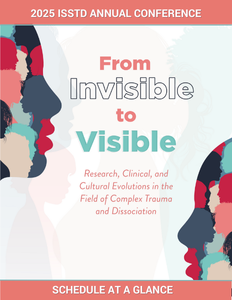Back
Single Paper or Case Study
Paper Session #1
Maternal Disintegrative Responses Scale (MDRS) and Its Links to Childhood Trauma
Saturday, March 15, 2025
1:30 PM – 3:00 PM US Eastern Time
Learning Level: Beginning

Miriam Chasson, PhD
Postdoctoral fellow
Harvard University
Cambridge, Massachusetts, United States- OT
Orit Taubman - Ben-Ari, PhD
Professor
Bar Ilan University
Ramat Gan, HaMerkaz, Israel
Abstract
Background
Alongside the satisfaction and happiness typically aroused by caring for a young infant, the high demands of early maternal caregiving can also trigger disintegrative responses, such as intrusive thoughts and dissociative experiences.
Objectives
In a series of three studies we sought to: 1) develop and validate a bidimensional scale, i.e., the Maternal Disintegrative Responses Scale (MDRS), examining mothers’ intrusive thoughts and dissociative experiences in the context of infant care; and 2) using a prospective design, examine the role of a mother's maternal disintegrative responses and her personal resources (self-compassion, personal growth) in the association between her developmental history, i.e., adverse and benevolent childhood experiences (ACE; BCE), and the parenting outcomes of maternal self-efficacy, and role satisfaction.
Methods
In Study 1 (N=455) mothers to infants up to 12 months, completed the MDRS and a series of questionnaires assessing postnatal depression (EPDS), childbirth‐related post‐traumatic stress disorder (PTSD), obsessive‐compulsive disorder (OCD), and general dissociation. In Study 2, two samples were recruited. Sample 1, comprised of 249 mothers, completed questionnaires assessing maternal disintegrative responses, trait anxiety, and attachment orientation; Sample 2, comprised of 637 mothers, completed questionnaires assessing the MDRS, psychological distress, and ACE. In Study 3, 385 mothers completed questionnaires 16 weeks after childbirth (Phase 1) and again 6-10 months postpartum (Phase 2). They related to ACE and BCE (Phase 1), MDRS, self-compassion (Phases 1 and 2), and maternal self-efficacy and role satisfaction (Phase 2).
Results
Study 1 showed that the MDRS displays good psychometric properties, with both factors related to EPDS, PTSD, OCD, and dissociation. Study 2 confirmed the factor structure of the MDRS and showed that insecure attachment and ACE were both related to the MDRS factors, above and beyond women's current level of anxiety or distress. Study 3 showed that in both phases, ACE was related to higher intrusive thoughts, which in turn was associated with lower role satisfaction. In addition, in both phases, BCE was related to higher self-compassion, which in turn was associated with higher maternal self-efficacy and role satisfaction.
Conclusions and Implications
The findings indicate the value of the MDRS as a promising and valid questionnaire for mothers following childbirth. In addition, they demonstrate that the vulnerability of mothers who experienced ACE may lead to a higher level of maternal disintegrative responses, which may impair their parenting experience. Moreover, the results point to a combination of environmental and personal variables which may mitigate these outcomes.
Background
Alongside the satisfaction and happiness typically aroused by caring for a young infant, the high demands of early maternal caregiving can also trigger disintegrative responses, such as intrusive thoughts and dissociative experiences.
Objectives
In a series of three studies we sought to: 1) develop and validate a bidimensional scale, i.e., the Maternal Disintegrative Responses Scale (MDRS), examining mothers’ intrusive thoughts and dissociative experiences in the context of infant care; and 2) using a prospective design, examine the role of a mother's maternal disintegrative responses and her personal resources (self-compassion, personal growth) in the association between her developmental history, i.e., adverse and benevolent childhood experiences (ACE; BCE), and the parenting outcomes of maternal self-efficacy, and role satisfaction.
Methods
In Study 1 (N=455) mothers to infants up to 12 months, completed the MDRS and a series of questionnaires assessing postnatal depression (EPDS), childbirth‐related post‐traumatic stress disorder (PTSD), obsessive‐compulsive disorder (OCD), and general dissociation. In Study 2, two samples were recruited. Sample 1, comprised of 249 mothers, completed questionnaires assessing maternal disintegrative responses, trait anxiety, and attachment orientation; Sample 2, comprised of 637 mothers, completed questionnaires assessing the MDRS, psychological distress, and ACE. In Study 3, 385 mothers completed questionnaires 16 weeks after childbirth (Phase 1) and again 6-10 months postpartum (Phase 2). They related to ACE and BCE (Phase 1), MDRS, self-compassion (Phases 1 and 2), and maternal self-efficacy and role satisfaction (Phase 2).
Results
Study 1 showed that the MDRS displays good psychometric properties, with both factors related to EPDS, PTSD, OCD, and dissociation. Study 2 confirmed the factor structure of the MDRS and showed that insecure attachment and ACE were both related to the MDRS factors, above and beyond women's current level of anxiety or distress. Study 3 showed that in both phases, ACE was related to higher intrusive thoughts, which in turn was associated with lower role satisfaction. In addition, in both phases, BCE was related to higher self-compassion, which in turn was associated with higher maternal self-efficacy and role satisfaction.
Conclusions and Implications
The findings indicate the value of the MDRS as a promising and valid questionnaire for mothers following childbirth. In addition, they demonstrate that the vulnerability of mothers who experienced ACE may lead to a higher level of maternal disintegrative responses, which may impair their parenting experience. Moreover, the results point to a combination of environmental and personal variables which may mitigate these outcomes.
Learning Objectives:
At the conclusion of this session participants will be able to:
- Describe the development and validation process of the Maternal Disintegrative Responses Scale (MDRS) and its significance in assessing maternal intrusive thoughts and dissociative experiences
- Explain the relationship between adverse childhood experiences (ACE) and maternal disintegrative responses, and how these responses impact maternal self-efficacy and role satisfaction
- Identify the psychometric properties of the MDRS and its associations with postpartum mental health conditions such as depression, PTSD, OCD, and general dissociation
- Analyze how self-compassion can mitigate the negative effects of maternal disintegrative responses on parenting outcomes
- Discuss the clinical implications of encouraging mothers to acknowledge and process their disintegrative responses as a pathway to personal reintegration and improved maternal well-being

